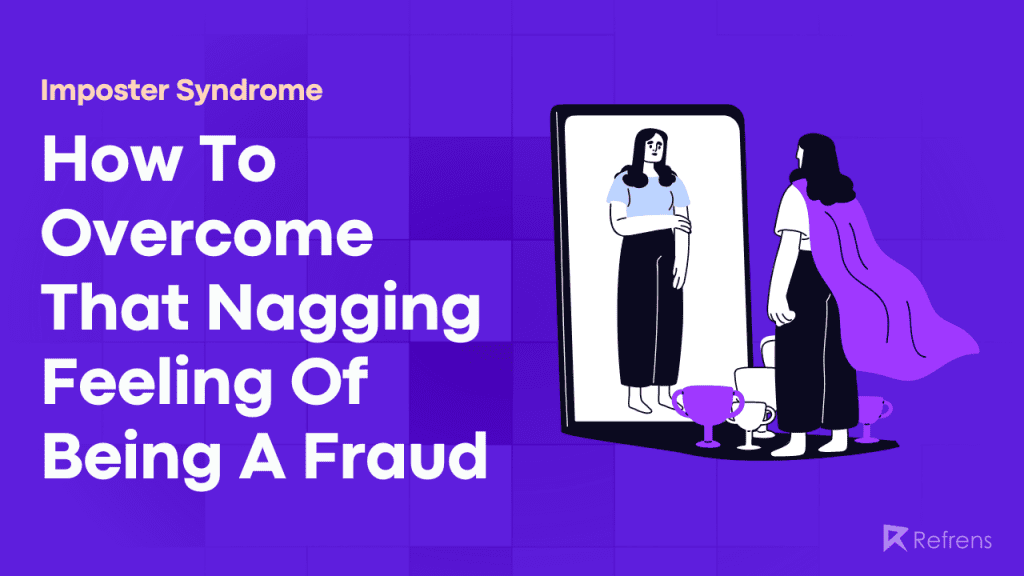The term “impostor syndrome” frequently triggers a strong sense of identification, particularly among millennials and Gen X. They can relate to this term on a personal level.
It’s that nagging feeling that you don’t belong, and it affects freelancers and minority groups disproportionately. Usually, the imposter syndrome plays out during public speeches, negotiations, while receiving compliments, or even during parenting.
The term “imposter syndrome” was coined by psychologists Pauline R. Clance and Suzanne A. Imes in 1978.
They published a paper titled “The Impostor Phenomenon in High Achieving Women: Dynamics and Therapeutic Intervention” in which they described the psychological phenomenon.
They observed that some high-achieving individuals, particularly women, experienced persistent self-doubt and a fear of being exposed as frauds despite evidence of their competence and accomplishments.
In this article, we will explore the causes of Imposter Syndrome, its effects on freelancers, and most importantly, effective methods to conquer it, empowering you to excel in your freelance career with renewed self-assurance. But first, let’s crack open this feeling.
What is the Feeling Like?
Experiencing a surge of self-doubt? It could be a sign of impostor syndrome — a complex phenomenon that doesn’t follow a single pattern. It can manifest in various ways, such as:
You Feel Like A Fraud
You experience a sense of being fraudulent, even after achieving notable milestones like securing a job, gaining recognition, or receiving awards.
Despite these accomplishments, the feeling persists that your success is not genuine and that you may have deceived others.
There’s a constant fear of being exposed as if everything you’ve achieved is an illusion that could unravel at any moment.
You Underestimate Your Own Value
This set usually is over-accommodating offering things for free.
This mindset can result in feelings of inadequacy, reluctance to accept praise or recognition, and even turning down opportunities or rewards that they deserve.
It is a common aspect of impostor syndrome, where individuals have a persistent belief that they are not as competent or accomplished as others perceive them to be, despite evidence of their success.
You Question Your Every Opinion
This behavior often involves seeking validation from others and constantly seeking reassurance that their opinions are valid or correct.
The person may worry about being wrong or fear criticism for expressing their views.
This pattern of self-doubt can lead to hesitation in decision-making, difficulty in asserting oneself, and a general lack of self-assurance in various aspects of life.
The Origins of Imposter Syndrome
Imposter Syndrome often stems from various sources, such as societal expectations, past experiences, and comparisons to others.
Many freelancers find themselves questioning their capabilities due to perceived failures or the pressure to maintain a perfect image. Understanding the roots of this phenomenon is crucial in conquering it. The three origins of impostor syndrome are as follows:
- Personality and Cognitive Factors
This origin relates to an individual’s personality traits and cognitive patterns. Perfectionism, the fear of failure, and a tendency to discount one’s achievements are common factors contributing to impostor feelings.
- Family and Upbringing
The second origin stems from early experiences and upbringing. Family dynamics, parental expectations, and the way achievements were praised or criticized during childhood can shape one’s perception of success and self-worth.
- Social and Cultural Influences
The third origin involves external factors like societal norms, cultural expectations, and workplace environments. Stereotypes, gender roles, and the pressure to conform to certain standards can intensify feelings of being an impostor.
The Effects of Imposter Syndrome on Freelancers
Impostor syndrome can profoundly influence freelancers, leaving a significant impact on both their professional and personal lives. Let’s delve deeper into these effects:
1. Undercharging for Services: Freelancers experiencing impostor syndrome may undervalue their skills and expertise, leading them to charge lower rates for their services than they deserve. This can negatively impact their income and make it challenging to sustain their freelance career.
2. Difficulty in Promoting Themselves: Impostor syndrome can make freelancers hesitant to promote themselves and their work. They might feel unworthy of praise or recognition, which can hinder their ability to attract new clients and grow their business.
Read our article on How To Excel At Self-Promotion As A Freelancer if you too find it difficult to promote yourself.
3. Fear of Taking on Challenging Projects: Freelancers with impostor syndrome might shy away from taking on more complex or high-profile projects, fearing that they will not be able to meet the client’s expectations. This limits their professional growth and potential to expand their skill set.
4. Procrastination and Perfectionism: Impostor syndrome can lead to procrastination and perfectionism. Freelancers may spend excessive time obsessing over details and revising their work, fearing that any mistake will reveal them as frauds.
5. Reduced Confidence and Productivity: Constant self-doubt can erode a freelancer’s confidence and productivity. They may spend too much time seeking validation or comparing themselves to others, which can hinder their ability to focus on their work.\
Though consistently learning and upskilling yourself can help boost your confidence. Read Why Is Continuous Upskilling Important For A Freelancer
You may also benefit from Top 10 Freelance Courses Online
6. Isolation and Avoiding Collaboration: Impostor syndrome can make freelancers feel isolated, believing that they don’t belong in professional circles. They may avoid collaborating with other freelancers or networking events, missing out on valuable opportunities for growth and support.
7. Negative Mental Health Impact: The persistent feelings of inadequacy and self-doubt associated with impostor syndrome can take a toll on a freelancer’s mental health. Anxiety, stress, and burnout can result from the constant fear of being exposed as a fraud.
Recognizing the Early Signs of Imposter Syndrome
Recognizing the early signs of impostor syndrome can help you address it before it takes a toll on your self-esteem and confidence. Here are some key indicators to be mindful of:
Self-Doubt: Frequent self-doubt is a common early sign of impostor syndrome. If you constantly question your abilities or find it challenging to accept compliments, it might be an early indicator.
Downplaying Achievements: If you tend to downplay your achievements, attributing them to luck or external factors rather than acknowledging your skills and hard work, this could be a sign of impostor syndrome.
Fear of Failure: An intense fear of failure, to the point where it paralyzes you from taking risks or pursuing new opportunities, is another early sign of impostor syndrome.
Perfectionism: A constant need to be perfect and a fear of making mistakes can indicate impostor feelings. Perfectionism can lead to procrastination and dissatisfaction with your work.
Psych Yourself Up: How To Overcome Imposter Syndrome
Here are four exercises that can shift your self-perception in a positive way:
- Make a List: Create a list of at least ten reasons why you are just as qualified as anyone else for the role you seek. If you’re struggling, question whether there’s any evidence that you are less qualified than others or perhaps even more qualified.
- Say Your Name Aloud: Use positive affirmations, such as “I’m awesome,” and personalize them by adding your name. For example, say, “Jessica is awesome.” Research shows that this simple act can have a powerful effect on how you perceive yourself. Even renowned individuals like LeBron James and Nobel laureate Malala Yousafzai have used this technique.
- Own Your Accomplishments: Take pride in your achievements and resist the urge to downplay them with explanations like “luck” or “help from others.” Instead, own the role you played in your success and confidently acknowledge your accomplishments.
- Visualize Success: Before facing a challenging situation, visualize yourself navigating it successfully. This technique, often taught to military recruits, can help you stay calm and confident. Whether it’s a job interview, presentation, or a big game, envision yourself excelling in that situation.
There’s a possibility that someone from your freelance team is going through something similar. Read: How to Motivate & Empower Your Freelance Team to ensure healthy operations among your team members.
Remember: You are Not Alone
When suffering from self-doubt, it’s easy to think that you’re the only one who’s ever felt that way — but it’s not true.
Even the most successful, powerful, and accomplished have been unsure of themselves at one point or another. But don’t take our word for it.
Here are a few former impostors in their own words:
Maya Angelou: The prize-winning author once said, after publishing her 11th book, that every time she wrote another one she’d think to herself: “Uh-oh, they’re going to find out now. I’ve run a game on everybody.”
Michelle Obama: The former first lady has spoken and written about how, as a young woman, she used to lie awake at night asking herself: Am I too loud? Too much? Dreaming too big? “Eventually, I just got tired of always worrying what everyone else thought of me,” she said. “So I decided not to listen.”
Tom Hanks: The acclaimed actor, Tom Hanks, has discussed his bouts with imposter syndrome. He shared, “No matter what we’ve done, there comes a point where you think, ‘How did I get here? When are they going to discover that I am, in fact, a fraud and take everything away from me?
Sheryl Sandberg: The COO of Facebook and author of “Lean In,” Sheryl Sandberg, has opened up about imposter syndrome, especially as a woman in leadership. She mentioned, “There are still days I wake up feeling like a fraud, not sure I should be where I am.
Also Read: 7 Tips For Juggling Multiple Freelance Clients/Projects
Also explore: Freelancer’s Guide To Plagiarism
Read more: Covid-19 Impact on Freelance Payment
Read more: Top 10 Billing Software For Chartered Accountants


















